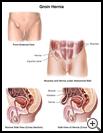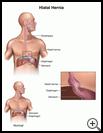
Hernias: Overview
________________________________________________________________________
KEY POINTS
- When you have a hernia, part of your intestine (bowel) bulges through a weak area or gap in your muscles. There are several kinds of hernias, based on where in the body they happen.
- Surgery to repair the opening in the muscle wall is the main treatment for a hernia.
- Ask your provider how to take care of yourself at home, if there are activities you should avoid, and when you can return to your normal activities.
________________________________________________________________________
What is a hernia?
When you have a hernia, part of your intestine (bowel) bulges through a weak area or gap in your muscles. There are several kinds of hernias, based on where in the body they happen:
- Inguinal or groin hernia. A groin hernia is a hernia in the lower part of your belly, where your legs join the lower part of your body. Another name for groin hernia is inguinal hernia because the bowel bulges into the inguinal canal, a space between layers of muscle in your groin. This is the most common type of hernia.
- Hiatal hernia. With a hiatal hernia, part of the stomach pokes through the diaphragm up into your chest. The diaphragm is a muscle between your chest and belly that helps you breathe. This is another common kind of hernia.
- Ventral or incisional hernia. This is a hernia that appears in your belly at the site of a previous surgery. This kind of hernia is rare.
- Umbilical hernia. An umbilical hernia is near the bellybutton, which is a naturally weak area. This type of hernia is most common in babies, but may happen later in life.
- Epigastric hernia. An epigastric hernia is in the upper belly, between the rib cage and bellybutton. This type of hernia may contain fatty tissue rather than intestines poking through the muscles.
- Femoral hernia. A femoral hernia is just below the groin crease near the femoral vein that carries blood from the leg. It usually the result of pregnancy and childbirth and is quite rare.
What is the cause?
A hernia may be caused by anything that causes the intestines to push against a weak area in your belly muscles. Some people are born with a weakness in these muscles. A hernia can happen to anyone, but most types are more common in men than women. It can happen when you:
- Lift heavy objects
- Cough or sneeze a lot
- Push too hard when you have a bowel movement
- Are overweight
- Are pregnant
Men with an enlarged prostate can sometimes get a hernia from pushing too hard to urinate. It may also happen after you have had surgery in your belly.
What are the symptoms?
Symptoms of most types of hernias may include:
- Pain or discomfort in the belly or groin, especially with physical activity
- A lump that appears when you lift something or exert yourself
- A lump that you can push back in
- A burning, aching, or heavy feeling in part of your belly
- A swollen or enlarged scrotum in men or boys
If you have a lump that cannot be pushed back, it can mean that part of your intestines is trapped in the gap between the muscles and you need to get medical care right away. A hernia can become a serious problem if your intestines get trapped. Then blood cannot get to that part of your intestines and part of the intestines may die. This can make you very sick. If this happens, you need surgery right away.
Many people with a hiatal hernia never have any symptoms. However, in some cases it causes stomach acid to flow back into the esophagus. The esophagus is the tube that carries food from your throat to your stomach. Symptoms may include burning pain in your chest or throat, a bitter taste in your mouth, a feeling of bloating or fullness in your stomach, and frequent belching or dry coughing.
How is it diagnosed?
Your healthcare provider will ask about your symptoms and medical history and examine you. Tests may include:
- An ultrasound, which uses sound waves to show pictures of the organs inside the lower belly
- CT scan, which uses X-rays and a computer to show detailed pictures of the organs inside the belly
- X-rays
How is it treated?
Surgery to repair the opening in the muscle wall is the main treatment for most types of hernias. Your healthcare provider will close the weak spot. Your provider may sew a piece of mesh over the weak spot and under the skin to make the area stronger.
The hernia will not get better on its own without treatment, but it also may not get worse for months or even years. If your hernia is not causing problems, you may choose not to have surgery. You may need to use a groin support. Ask your healthcare provider what is recommended for you.
If you have a hiatal hernia, your provider may recommend medicine to lower the acid in your stomach, losing weight, and quitting smoking. Most often, these changes will control your symptoms.
How can I take care of myself?
- Make sure that you know symptoms to watch for that might mean the hernia has trapped your intestines. This is a medical emergency and you would need surgery right away.
- Follow safe practices when you move heavy things. Learn how to lift and move heavy items safely. Remember to use your legs. Bend at your knees, not at your waist. Ask your healthcare provider how many pounds you can safely lift.
- Ask your provider if you need to wear a groin support.
- Try to keep a healthy weight. If you are overweight, lose weight.
- Avoid constipation by eating foods that are high in fiber, using stool softeners, or drinking a natural stimulant beverage, like prune juice. Drink plenty of water. Use laxatives or enemas only if recommended by your provider.
- If you smoke, try to quit. Smoking may cause coughing, which puts extra pressure on the belly and groin muscles. It’s also important to stop smoking if you need surgery. Stopping 6 weeks or more before surgery can lower your chances of complications from surgery, such as pneumonia. Talk to your healthcare provider about ways to quit smoking.
- Take medicine as needed to reduce sneezing and coughing from allergies.
Follow the full course of treatment prescribed by your healthcare provider. Ask your provider:
- How and when you will get your test results
- How long it will take to recover
- If there are activities you should avoid and when you can return to your normal activities
- How to take care of yourself at home
- What symptoms or problems you should watch for and what to do if you have them
Make sure you know when you should come back for a checkup. Keep all appointments for provider visits or tests.


